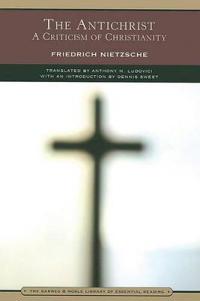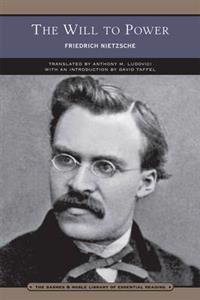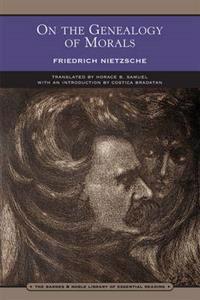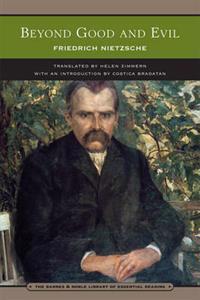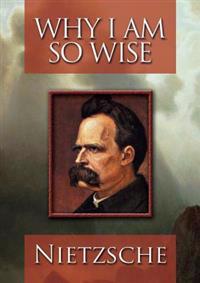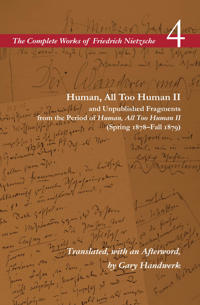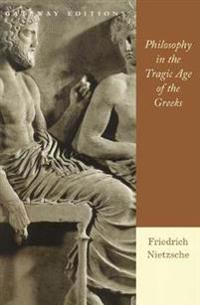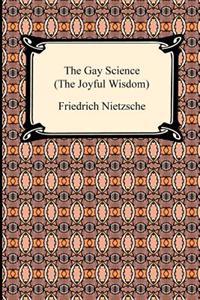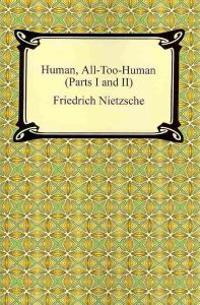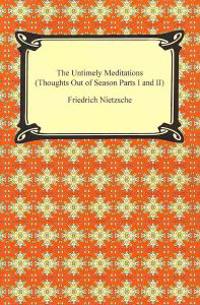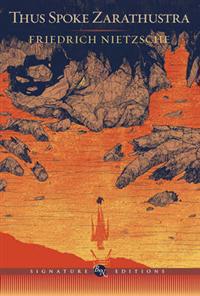Friedrich Wilhelm Nietzsche (Inbunden)
avWilliam H. F. Altman
ISBN: 9780739171660 - UTGIVEN: 201210When careful consideration is given to Nietzsche's critique of Platonism and to what he wrote about Bismarck, Kaiser Wilhelm, and to Germany's place in "international relations" (die Grosse Politik), the philosopher's carefully cultivated "pose of untimeliness" is revealed to be an imposture. As Wil[...]
The Antichrist (Pocket)
avFriedrich Wilhelm Nietzsche, Dennis (INT) Sweet, Anthony M. (TRN) Ludovici
ISBN: 9780760777701 - UTGIVEN: 2006-03The Will to Power (Häftad)
avFriedrich Wilhelm Nietzsche
ISBN: 9780760777770 - UTGIVEN: 201306If there are still such things, in this ironic postmodern age, as dangerous thoughts, surely no book is more overflowing with them than Friedrich Nietzsche's "Will to Power". No other great work of recent literature has heralded the decline of modern Western civilization as emphatically. In "The Wil[...]
On the Genealogy of Morals (Pocket)
avFriedrich Wilhelm Nietzsche, Horace B. (TRN) Samuel, Costica (INT) Bradatan
ISBN: 9780760780817 - UTGIVEN: 2006-09Beyond Good and Evil (Pocket)
avFriedrich Wilhelm Nietzsche, Costica (INT) Bradatan, Helen (TRN) Zimmern
ISBN: 9780760791073 - UTGIVEN: 2007-10Why Am I So Wise (Inbunden)
avFriedrich Wilhelm Nietzsche
ISBN: 9780785825135 - UTGIVEN: 2009-05He has been called a brilliant thinker, strikingly original, subversive, evil, creative, brazen, intellectually passionate, challenging, and the Anti-Christ ("God is a crude answer, a piece of indelicacy against us thinkers").
Reading German philosopher, Friedrich Nietzsche (1844-1900), can be a[...]Human, All Too Human, I (Pocket)
avFriedrich Wilhelm Nietzsche
ISBN: 9780804741712 - UTGIVEN: 2000-11This is the second volume to appear in an edition that will be the first complete, critical, and annotated English translation of all of Nietzsche s work. Volume 2: Unfashionable Observations, translated by Richard T. Gray, was published in 1995. The edition is a new English translation, by various [...]
The Physical Care of People with Mental Health Problems (Inbunden)
avFriedrich Wilhelm Nietzsche
ISBN: 9780857029201 - UTGIVEN: 201301This accessible, practical text provides mental health practitioners with the core knowledge and skills they need to be able to care effectively for the physical health of those who have been diagnosed with mental illness. Linked closely to professional standards, and with a clear values- and eviden[...]
On the Genealogy of Morality (Häftad)
avFriedrich Wilhelm Nietzsche
ISBN: 9780872202832 - UTGIVEN: 199811On the Genealogy of Morality contains some of Nietzsche's most disturbing ideas and images: eg the 'slave revolt' in morality, which he claims began with the Jews and has now triumphed, and the 'blond beast' that must erupt, which he claims to find behind all civilisation. It is therefore a major so[...]
Twilight of the Idols Or, How to Philosophize With a Hammer (Inbunden)
avFriedrich Wilhelm Nietzsche, Richard (TRN) Polt, Tracy (INT) Strong
ISBN: 9780872203556 - UTGIVEN: 1997-03This book presents a vivid, compressed overview of many of Nietzsche's mature ideas, including his attack on Plato's Socrates and on the Platonic legacy in Western philosophy and culture. Polt provides a trustworthy rendering of Nietzsche's text in contemporary American English, complete with notes [...]
Philosophy in a Tragic Age (Häftad)
avFriedrich Wilhelm Nietzsche
ISBN: 9780895267108 - UTGIVEN: 199608For Nietzsche the Age of Greek Tragedy was indeed a tragic age. He saw in it the rise and climax of values so dear to him that their subsequent drop into catastrophe (in the person of Socrates - Plato) was clearly foreshadowed as though these were events taking place in the theater.
And so in thi[...]On the Advantage and Disadvantage of History for Life (Inbunden)
avFriedrich Wilhelm Nietzsche
ISBN: 9780915144952 - UTGIVEN: 198706On the Genealogy of Morals (Häftad)
avFriedrich Wilhelm Nietzsche
ISBN: 9780988668577 - UTGIVEN: 2013-09Der Wille Zur Macht; Versuch Einer Umwerthung Aller Werthe (Studien Und Fragmente) (Häftad)
avFriedrich Wilhelm Nietzsche
ISBN: 9781235333538 - UTGIVEN: 201201Thus Spake Zarathustra (Pocket)
avNietzsche, Friedrich Wilhelm
ISBN: 9781420929133"Thus Spake Zarathustra" is the fictional account of the travels and teachings of Zarathustra, known also as Zoraster, the Persian prophet and founder of Zoroastrianism. What Nietzsche is portraying here is a new or different Zarathustra though, one with a morality alternate to that of the tradition[...]
The Gay Science (the Joyful Wisdom) (Häftad)
avFriedrich Wilhelm Nietzsche
ISBN: 9781420934212 - UTGIVEN: 200901The Twilight of the Idols and the Antichrist (Häftad)
avFriedrich Wilhelm Nietzsche
ISBN: 9781420934229 - UTGIVEN: 2009-01Human, All-Too-Human (Parts I and II) (Häftad)
avFriedrich Wilhelm Nietzsche
ISBN: 9781420934540 - UTGIVEN: 2010-01The Untimely Meditations (Thoughts Out of Season Parts I and II) (Häftad)
avFriedrich Wilhelm Nietzsche
ISBN: 9781420934557 - UTGIVEN: 2010-01The Will to Power (Volumes I and II) (Häftad)
avFriedrich Wilhelm Nietzsche, Oscar Levy
ISBN: 9781420935011 - UTGIVEN: 2010-01The Genealogy of Morals (Häftad)
avFriedrich Wilhelm Nietzsche
ISBN: 9781420948226 - UTGIVEN: 2013-01Beyond Good and Evil (Inbunden)
avFriedrich Wilhelm Nietzsche
ISBN: 9781421806228 - UTGIVEN: 2005-07Thus Spoke Zarathustra (Inbunden)
avFriedrich Wilhelm Nietzsche
ISBN: 9781435136441 - UTGIVEN: 201212Presented in hardcover, this title has been carefully edited and reset in a modern design for greater readability. It includes an introduction, informative notes and a chronology of the writer's life and times to enable the reader to gain a deeper understanding of these enduring works.[...]


